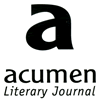Responses
Dear Acumen,
Charles Hobday has some justification for his comments in reference to my article (Acumen 44) if only because the relation of Romanticism to politics is too complex to be treated properly in a short space. He points to the political involvement of several Romantic poets, and takes these examples to be contrary to my general argument. But in fact I did say that one of the cardinal features of Romanticism in all ages has been a sense of alienation from the prevailing social norms. Often this disenchantment found expression in political radicalism. We would presumably agree that this was not universally the case; Keats, for example, is often cited in vivid contrast to Shelley, and I am a little surprised at Hobday’s inclusion of Dylan Thomas among the political activists. But it still seems to me that generally speaking, and particularly with reference to the early 19th century, those Romantics who opposed the mores of their contemporary society did so because they felt that it ignored the subjective, climactic experiences they so valued and sought. They hoped to join forces with those who simply strove for greater political freedom and the relief of poverty, but their ideals were of another stamp. By the twentieth century, with which I was chiefly concerned, the position was rather different. Many of the better known poets of the thirties, but by no means all, were strongly leftwing and felt that the threatening international situation and the immanence of revolution were themes that dominated all others, so that anything “purely personal” had to find a niche within this overriding concern. It was not until the very late thirties and in the forties that a recognisably neo-Romantic poetry emerged, asserting once again the primacy of individual experience. The subsequent course of events I believe to have been as sketched in my article; I regard Larkin as a fine poet, but the legacy he left was an unfortunate one, to put it mildly. However, matters now seem to be on the mend.
A.C.Clarke takes me to task for suggesting that irony and scepticism have been the main features of the poetry of the last few decades (again until quite recently) and cites example of poets who work certainly conveys a strong emotional charge. These are not in dispute, but if one is to risk any comment about trends in poetry one has to generalise and to speak of the literary centre of gravity, as it were, at any particular time. Such generalisations can only note salient features, and cannot apply universally.
Norman Kreitman
Edinburgh
Page(s) 86-87
magazine list
- Features

- zines

- 10th Muse
- 14
- Acumen
- Agenda
- Ambit
- Angel Exhaust
- ARTEMISpoetry

- Atlas
- Blithe Spirit
- Borderlines
- Brando's hat
- Brittle Star

- Candelabrum
- Cannon's Mouth, The
- Chroma
- Coffee House, The
- Dream Catcher
- Equinox
- Erbacce
- Fabric
- Fire
- Floating Bear, The
- French Literary Review, The
- Frogmore Papers, The
- Global Tapestry
- Grosseteste Review
- Homeless Diamonds
- Interpreter's House, The
- Iota
- Journal, The
- Lamport Court
- London Magazine, The
- Magma
- Matchbox
- Matter
- Modern Poetry in Translation
- Monkey Kettle
- Moodswing
- Neon Highway
- New Welsh Review
- North, The
- Oasis
- Obsessed with pipework
- Orbis
- Oxford Poetry
- Painted, spoken

- Paper, The
- Pen Pusher Magazine

- Poetry Cornwall
- Poetry London
- Poetry London (1951)
- Poetry Nation
- Poetry Review, The
- Poetry Salzburg Review
- Poetry Scotland
- Poetry Wales
- Private Tutor
- Purple Patch
- Quarto
- Rain Dog
- Reach Poetry
- Review, The
- Rialto, The
- Second Aeon
- Seventh Quarry, The
- Shearsman
- Smiths Knoll
- Smoke
- South
- Staple
- Strange Faeces
- Tabla Book of New Verse, The
- Thumbscrew
- Tolling Elves
- Ugly Tree, The
- Weyfarers
- Wolf, The

- Yellow Crane, The
